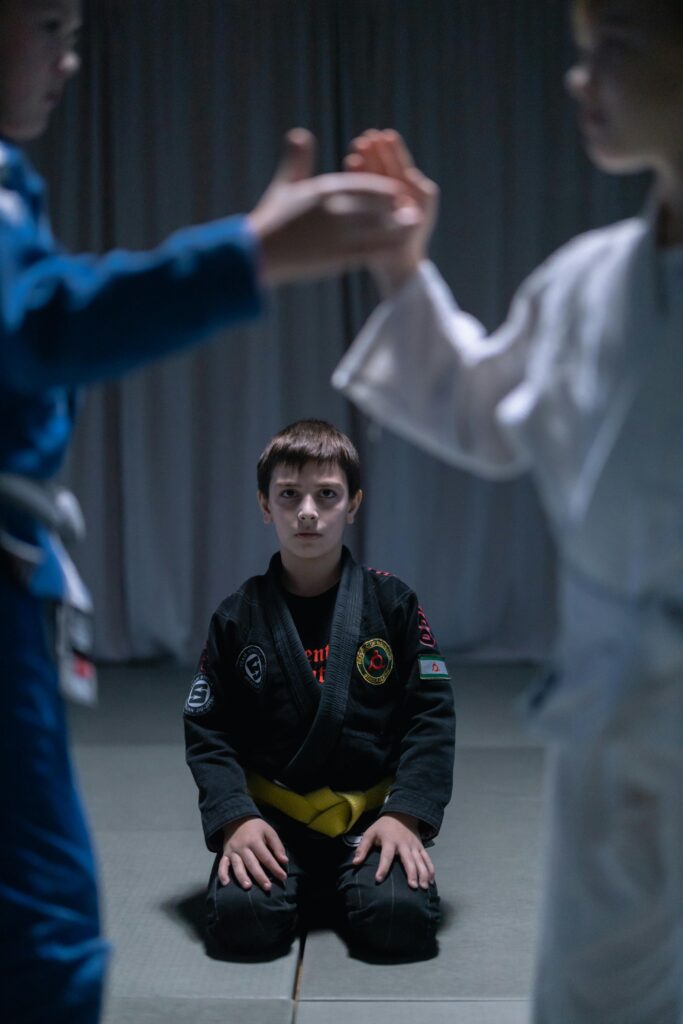Being grabbed from behind is one of the most startling and intimidating situations you could face. It catches you off guard, leaving little time to think.
But here’s the good news: with the right techniques and, most importantly, situational awareness, you can learn how to defend yourself when someone grabs you from behind and stay safe.
This article will guide you through why being aware of your surroundings matters and how it plays a vital role in handling a rear attack.
You’ll also learn practical strategies and simple steps to prepare yourself physically and mentally for such situations.
Why Rear Attacks Are Particularly Dangerous
Rear attacks are terrifying because they exploit your most vulnerable moments. The attacker doesn’t need to overpower you—they just rely on catching you off guard.
These situations usually happen when you’re distracted, such as scrolling through your phone, lost in thought, or rushing to your car. They count on that brief window of inattention to gain control.
Many people’s first reaction is to pull away or try to twist around. Unfortunately, these moves often make things worse.
Struggling wastes energy and gives the attacker an advantage, allowing them to tighten their grip or throw you off balance. Without a plan, it’s easy to feel overwhelmed.
How Awareness Reduces Your Risk
Being aware of your surroundings isn’t about living in fear; it’s about staying present. Think of situational awareness as an invisible safety net, something you can carry with you at all times.
When you’re tuned in to your environment, you spot potential dangers early and reduce the chances of being surprised.
Recognizing Early Signs of Danger
There are often warning signs that something isn’t right. Here’s what to look for:
Unusual Behavior
Watch for anyone acting out of place, like following you closely or lingering without reason.
Environment Changes
Notice when you’re entering areas with poor lighting, limited visibility, or few people around.
Gut Instincts
Trust that uneasy feeling. Your intuition is often your first and best alert system.
By noticing these signs, you can take action, such as changing your route or seeking help, before a threat escalates.
Daily Awareness Habits
Staying aware doesn’t require constant vigilance. Instead, focus on small, practical habits that fit into your routine:
- Keep your phone in your pocket when walking, especially in unfamiliar areas.
- Take a moment to scan your surroundings before entering your car or a building.
- Walk confidently, with purpose. Attackers tend to avoid people who look alert and self-assured.
These simple practices go a long way toward keeping you safe and reducing your risk of being targeted.
Defensive Techniques for Rear Grabs
If someone grabs you from behind, staying calm and knowing what to do can make all the difference. Your goal is to break their grip quickly and create enough space to escape.
These straightforward techniques work because they’re practical and rely on instinctive movements.
Step 1: Stay Balanced and Stable
When grabbed, your attacker will try to unbalance you. Prevent this by planting your feet shoulder-width apart and bending your knees slightly. This position lowers your center of gravity and gives you a strong, stable base.
Think of it as anchoring yourself. Even if they pull or push, you’ll be harder to move. This simple adjustment can stop their momentum and buy you time to act.
Step 2: Use Simple, Effective Moves
You don’t need complex techniques to escape. These basic moves are easy to remember and deliver maximum impact:
Elbow Strike
Aim your elbow at their ribs, stomach, or face and drive it back with force. This move doesn’t require much precision to be effective.
Foot Stomp
Use your heel to stomp on the top of their foot. It’s a quick way to inflict pain and loosen their grip.
Hip Shift
Rotate your hips sharply to one side while lowering your weight. This disrupts their hold and creates enough space to break free.
Each of these moves works because it surprises the attacker and puts you back in control, even if only for a moment.
Step 3: Create Space and Escape
Once you’ve broken their grip, don’t hesitate. Move toward safety immediately. Head for a crowded area, shout for help, or use objects like parked cars or walls as barriers between you and the attacker.
The goal is to put as much distance as possible between you and the threat. Every second you’re in motion makes it harder for them to regain control, increasing your chances of getting away safely.
Practicing Awareness and Defense
Handling rear attacks effectively comes down to preparation. If you want to react confidently under pressure, you have to train in a way that makes your responses instinctive.
When the situation demands quick action, your body should already know what to do—no overthinking required.
Simulating Real-World Scenarios
One of the best ways to prepare is by mimicking real situations with a partner. Start slow, focusing on proper form and control.
Pay attention to details, like how your body shifts during an escape or how an elbow strike lands effectively. Gradually, increase the intensity to mirror real-life tension.
This practice builds familiarity with both the techniques and the pressure of unexpected scenarios. The key is controlled repetition with a clear focus on adapting to various situations rather than just drilling moves.
Improving Reflexes
Quick reflexes can mean the difference between escaping and struggling. Simple, consistent drills help sharpen your instincts:
Reaction Drills
Have a partner simulate different attacks, like a sudden grab or push, and practice breaking free or countering swiftly.
Balance Work
Stand your ground while a partner applies light pressure to push or pull you. This improves your ability to stay stable and maintain control under pressure.
The more you practice these exercises, the more naturally you’ll respond, turning hesitation into action when it matters most.
Staying Calm Under Pressure
Confidence isn’t just about the moves you know; it’s about staying calm enough to use them effectively.
Adrenaline can either help you focus or leave you frazzled, and the difference lies in how well you control your reactions. Keeping your mind steady ensures that you stay in control, even when things escalate quickly.
Breathing Techniques
Your first reaction to being grabbed might be to freeze or gasp, but shallow breathing only fuels panic.
Instead, take charge of your body with deep, steady breaths. Inhale deeply through your nose for four counts, hold it for four counts, and exhale slowly through your mouth for another four counts.
This technique not only calms your nerves but also keeps your energy focused and your mind clear, allowing you to react with purpose instead of panic.
Visualizing Success
Mental preparation is as important as physical training. Spend time visualizing yourself handling a rear grab successfully.
Imagine each step clearly: how you plant your feet, execute an escape move, and create distance from the attacker.
This practice helps your brain rehearse the process, making it feel familiar and achievable. Visualization builds your confidence, ensuring that you feel ready even if a real situation arises.
Integrating Awareness into Everyday Life
Awareness isn’t just for emergencies—it’s a habit you can develop in your daily routine. It’s not about being paranoid; it’s about staying tuned in to what’s happening around you.
By paying attention to details and making small adjustments, you create a safer space for yourself without extra effort.
Walking to Your Car
Always scan your surroundings as you approach your vehicle. Have your keys in hand, so you’re ready to unlock the door without fumbling or pausing.
Taking Public Transport
Stay aware of who enters and exits with you. Keep your back to a wall or solid surface when waiting, so you can see what’s happening around you.
Shopping or Running Errands
Park in well-lit, busy areas. Avoid spots that feel too isolated, even if they’re closer to the entrance.
These small habits may seem minor, but they add up to make a significant difference. Over time, awareness becomes automatic, ensuring you’re always one step ahead.
Empower Yourself with the Right Skills
You now know why situational awareness is your most powerful tool when it comes to defending yourself against a rear attack. It’s not just about reacting—it’s about being prepared, confident, and calm in any situation.
If you’re ready to turn this knowledge into real, actionable skills, Eye2Eye Combat is here for you.
With practical training, supportive instructors, and a focus on techniques you can use right away, our private defense training is the perfect way to build your confidence and strength.
Start your journey to safety today—schedule your first session and see what you’re capable of!
FAQs
What to do when someone grabs you from behind?
Stay calm and act quickly. Focus on stabilizing your balance by planting your feet shoulder-width apart and bending your knees slightly. This helps you stay grounded. Use quick, sharp movements like an elbow strike to break free and create space. The goal is to escape, so move toward safety as soon as possible.
How to defend against someone grabbing you?
Start by using simple, effective techniques. An elbow strike, a foot stomp, or rotating your hips can disrupt their hold. The key is to surprise them and create enough space to escape. Always aim for vulnerable areas like the ribs, toes, or face. Training these moves in a controlled setting can build your confidence.
What to do if someone picks you up from behind?
If you’re lifted off the ground, don’t panic. Use your legs to strike backward at their knees or shins—these are vulnerable points. You can also lean your body weight forward and twist to make holding you more difficult. Aim to disrupt their balance so you can get back on the ground and break free.
Can you fight back if someone grabs you?
Absolutely, but the goal isn’t to fight—it’s to escape safely. Use your defense techniques strategically, targeting weak points like their ribs, face, or feet. These actions should be quick and decisive, giving you the opportunity to get away. Remember, your safety is the priority, not engaging in a prolonged fight.
How can you avoid getting grabbed from behind?
Awareness is your best defense. Pay attention to your surroundings, especially in low-visibility areas like parking lots or alleys. Walk with confidence and keep your hands free when possible. By appearing alert and prepared, you make yourself less of a target.
Should I yell for help during an attack?
Yes, if it’s safe to do so. Yelling can attract attention and deter an attacker. Use short, clear commands like “Stop!” or “Help!” This not only alerts others nearby but may also make the attacker reconsider their actions. Be loud and assertive to maximize your chances of getting assistance.





